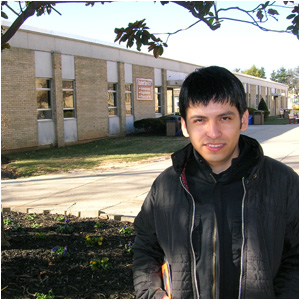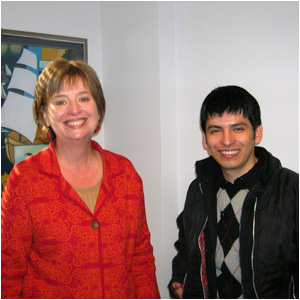Veder Garcia
By Ellen Guettler
It's been five years since Linda Robinson last saw her former student, Veder Garcia. But they've kept in touch. He knocks on the door to her office at Montgomery College, and they greet each other in a flurry of Spanish and English, switching smoothly from one to the other.
"You still look the same!" Robinson exclaims, looking at Garcia's short-cropped black hair and youthful face. "I thought I was going to see you with a beard, looking five years older. I'm the one who looks older!"
Garcia is back in Maryland at his old community college for a visit. He lives in Berkeley, California now. He has a fellowship there to finish his Ph.D. in plant biology. Garcia starts to tell his former teacher about his thesis on photosynthesis. But as he's talking about the "proteins in the lumen of the chloroplast" he starts laughing. He knows it's too complicated for most people to understand.
Not that long ago, it was Garcia who had trouble understanding.
He arrived in the United States as a high school junior speaking no English. He grew up in El Salvador on a small farm with his grandfather. His mother worked in the United States and sent money back to them. Between the ages of 2 and 17, Garcia saw his mother just twice.
When Garcia was 17, his mother got her green card and he moved to Maryland to live with her. Three days after he arrived, he started high school. His first day was bewildering.
"I was there, but not there," Garcia remembers. "Because I didn't understand anything. Actually I didn't speak English at all. I didn't even know which school bus to take back home. So luckily somebody helped me get on the right bus!"
The school placed Garcia in English as a Second Language (ESL) classes and he began to learn the language. He says it was a struggle to get through. It took him longer to do assignments. Sometimes he'd fail and have to try again. But he was persistent. He managed to get okay grades during his two years of American high school.
But Garcia's English skills were still low. He couldn't score high enough on the SATs or write the application essay it would take to get into the University of Maryland. So he enrolled at Montgomery College, where the application form was just one page long.
And that's where he met Linda Robinson. She taught his freshman orientation class. Robinson spoke Spanish too, so Garcia would go to her for advice. He still took an ESL class, but his English was improving.
Then Garcia discovered plant biology, a field he didn't even know existed. He was immediately drawn to it - it reminded him of the vegetables he'd observed on his grandfather's farm in El Salvador.
After Garcia had spent two and a half years at Montgomery College, Robinson helped him transfer to the University of Maryland where he could partner with a professor and do research. It was his research that got him accepted into the Ph.D. program at Berkeley.
Ideally, this is how community colleges work for students who want degrees. They get their first credits at community college, where tuition is cheaper and there's more support for struggling students, and then they transfer to four-year institutions to complete their degrees.
But for most students it doesn't work out that way. More than half of the students who enroll in community college planning to get a degree still don't have one six years later.
Garcia isn't sure why his story has turned out differently. He offers some of the credit to Robinson.
"You provided the road signs," he tells her. "Make a left, make a right. I don't know how many times I visited you, but you need somebody that kind of directs you in the right way."
Robinson always had a feeling that Garcia would make it. She saw him as a serious student, even if he was still learning to speak English. But his struggles weren't uncommon at Montgomery College. Just over 40 percent of the students come from homes where they speak a language other than English. Many students arrive ill-prepared for college classes. They've gone to high school in other countries - sometimes with stretches when they didn't go to school at all.
Robinson sees those students struggling. They have to take remedial courses that don't count toward their degree. They'll repeat classes, sometimes more than once. But Robinson learned long ago not to underestimate the ability of her students to be persistent.
"I've already seen people who have all the odds stacked against them [make] it," she says.
Veder Garcia says his own persistence, positive attitude, and support from the people around him helped get him through. And his future looks pretty bright. He tells Robinson about the research fellowship he got. He'll be in Germany for five weeks. He's imagining a post-doc one day. He told his mom someday he might even move to China.
"You have to know that you're going to fail sometimes," Garcia says. "And it's okay. That's when you learn more ... because anything's possible if you keep trying."
Back to Rising by Degrees.


